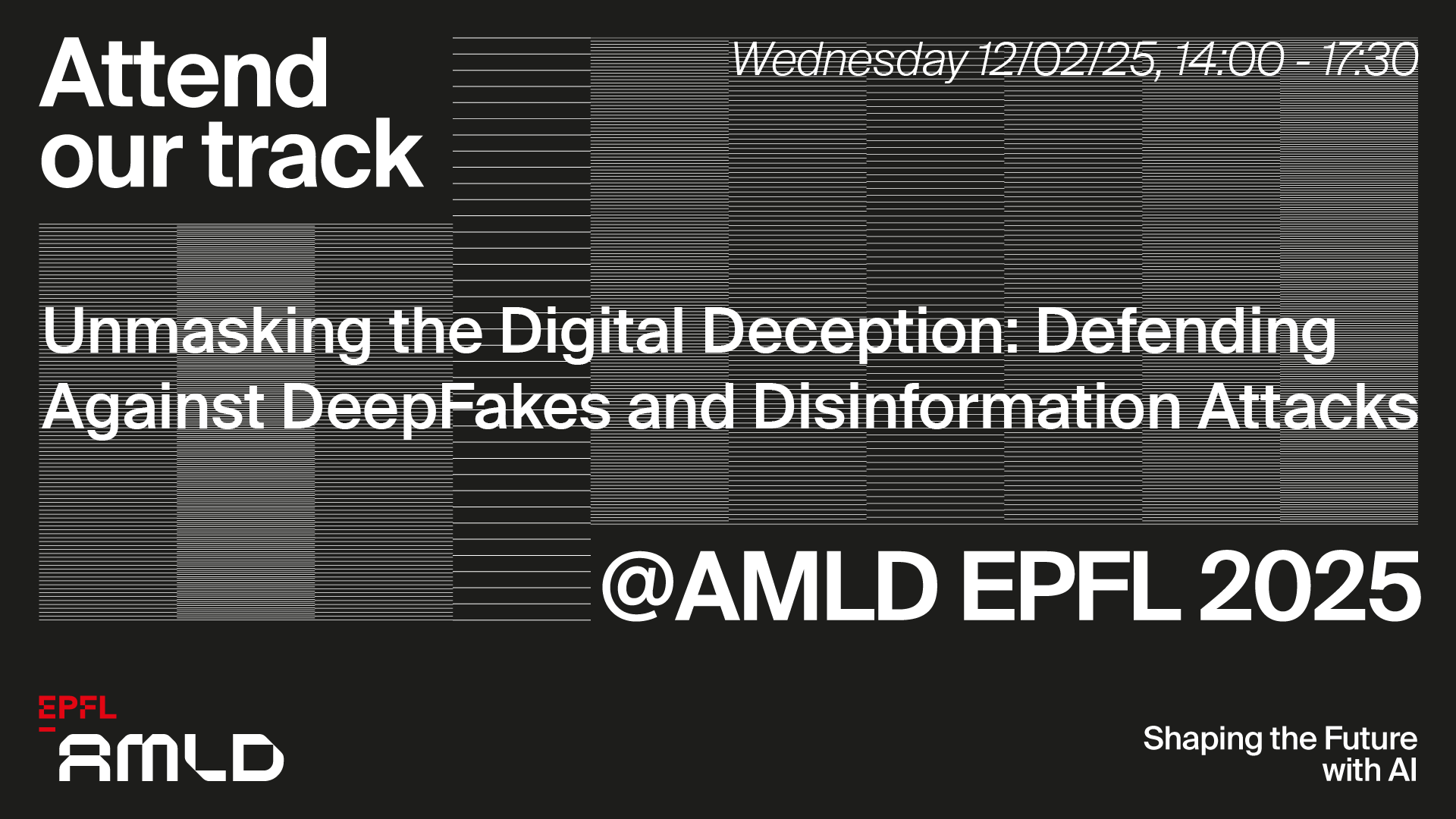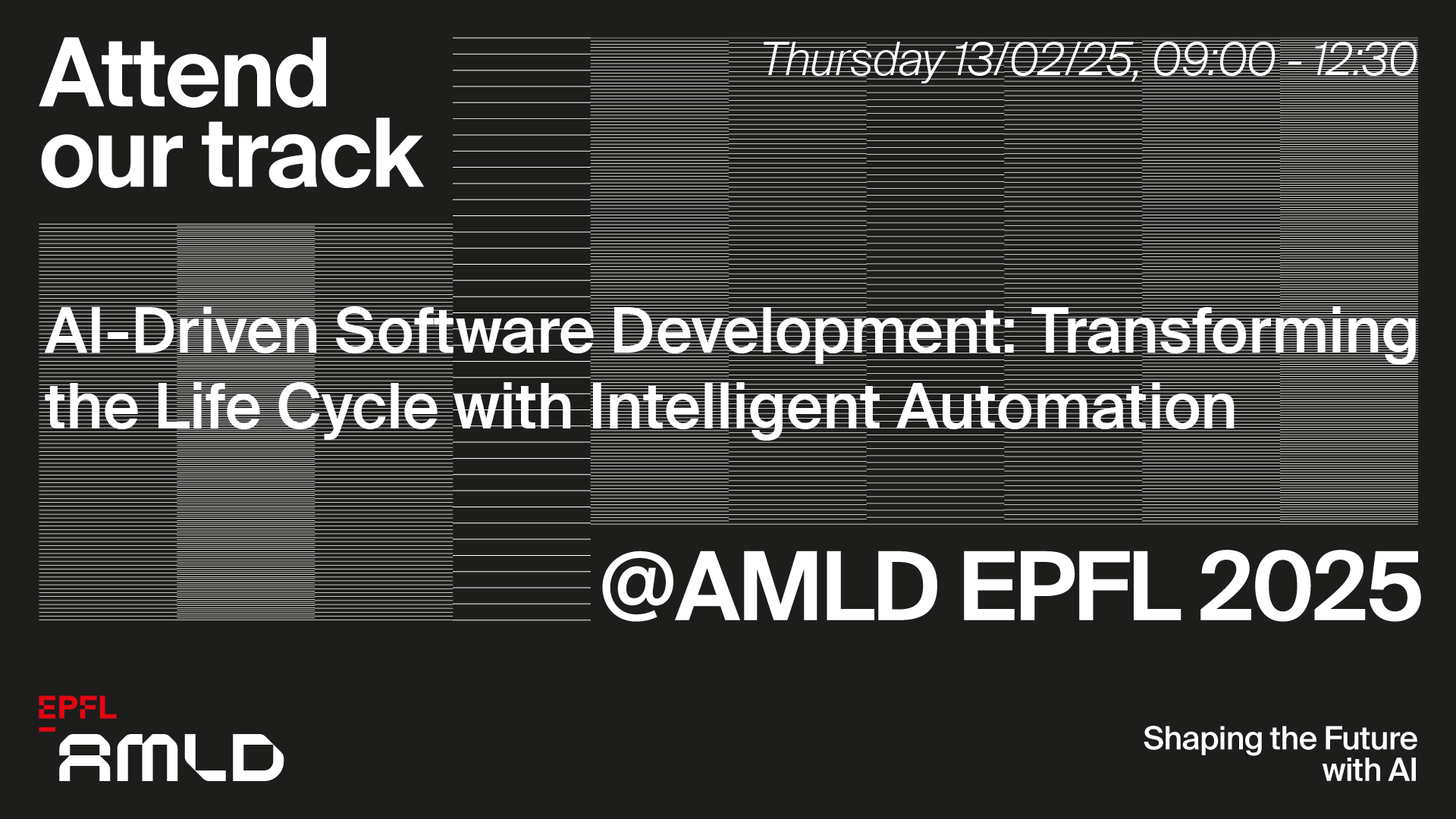aiFlows is developed in EPFL’s Data Science Lab (dlab) under the supervision of Prof. Robert West. Originally a code-to-code translation tool leveraging feedback loops between LLMs, it evolved organically into a broader framework for defining interactions between AI agents and other agents. Such collaborations between AI agents, non-AI agents and humans will become increasingly common (…)

EPFL and UNIL invite you to a special event on the theme of Artificial Intelligence on Saturday 23 November 2024 at the Rolex Learning Center.
A unique opportunity to better understand and embrace the AI revolution, while discussing the issues surrounding its use with an exclusive panel of scientists and experts. Laboratory demonstrations and workshops for adults and young people will also be on offer. The event is free of charge and open to all, aged 10 and over.

Following on the heels of our conference on “Deepfakes, Distrust and Disinformation: The Impact of AI on Elections and Public Perception”, which was held on October 1st 2024, C4DT proposes to shift the spotlight to the strategic and operational implications of deepfakes and disinformation for organizations. For our C4DT partners we are also hosting a hands-on workshop aimed at engineers, software developers and cybersecurity experts on Tuesday, 26th of November, which will allow the participants to develop skills and expertise in identifying and combating cyberattacks through deepfakes.

Following on the heels of our conference on “Deepfakes, Distrust and Disinformation: The Impact of AI on Elections and Public Perception”, which was held on October 1st 2024, C4DT proposes to shift the spotlight to the strategic and operational implications of deepfakes and disinformation for organizations. For our C4DT partners we are hosting a high-level roundtable for executives, senior managers and project managers on Tuesday, 19th of November, during which strategies to address the challenges posed by deepfakes, and collaboration opportunities and projects to counter them will be discussed.
As this real estate agency discovered only in hindsight, ChatGPT hallucinated into existence two schools that don’t even actually exist for one of the agency’s property listings. This serves as yet another reminder for all of us who increasingly rely on tools like ChatGPT that establishing AI trustworthiness remains very much a work in progress.
The main objective of the project is to perform online monitoring of technologies and technology actors in publicly accessible information sources. The monitoring concerns the early detection of mentions of new technologies, of new actors in the technology space, and the facts related to new relations between technologies and technology actors (subsequently, all these will be called technology mentions). The project will build on earlier results obtained on the retrieval of technology-technology actors using Large Language Models (LLMs).
The main objective of the project is to perform online monitoring of technologies and technology actors in publicly accessible information sources. The monitoring concerns the early detection of mentions of new technologies, of new actors in the technology space, and the facts related to new relations between technologies and technology actors (subsequently, all these will be called technology mentions). The project will build on earlier results obtained on the retrieval of technology-technology actors using Large Language Models (LLMs).
Pre-trained foundation models are widely used in deep learning applications due to their advanced capabilities and extensive training on large datasets. However, these models may have safety risks because they are trained on potentially unsafe internet-sourced data. Additionally, fine-tuned specialized models built on these foundation models often lack proper behavior verification, making them vulnerable to adversarial attacks and privacy breaches. The project aim is to study and explore these attacks in for foundation models.
Large Language Models (LLMs) have gained widespread adoption for their ability to generate coherent text, and perform complex tasks. However, concerns around their safety such as biases, misinformation, and user data privacy have emerged. Using LLMs to automatically perform red-teaming has become a growing area of research. In this project, we aim to use techniques like prompt engineering or adversarial paraphrasing to force the victim LLM to generate drastically different, often undesirable responses.
Neural Machine Translation (NMT) models have been shown to be vulnerable to adversarial attacks, wherein carefully crafted perturbations of the input can mislead the target model. In this project, we introduce novel attack framework against NMT. Unlike previous attacks, our new approaches have a more substantial effect on the translation by altering the overall meaning. This new framework can reveal the vulnerabilities of NMT systems compared to tradition methods.
Advancements in artificial intelligence, machine learning, and big data analytics highlight the potential of secondary health data use to enhance healthcare by uncovering insights for precision medicine and public health. This issue paper will provide clarity on the different types of health data, how they are shared and used, and propose approaches for enabling secondary health data use that align with Switzerland’s decentralized political structure, Swiss and EU regulatory frameworks, and technological developments in health data sharing.
In this project we introduce a new family of prompt injection attacks, termed Neural Exec. Unlike known attacks that rely on handcrafted strings (e.g., “Ignore previous instructions and…”), we show that it is possible to conceptualize the creation of execution triggers as a differentiable search problem and use learning-based methods to autonomously generate them.
Aircraft and their ground counterparts have been communicating via the ACARS data-link protocol for more than five decades. Researchers discovered that some actors encrypt ACARS messages using an insecure, easily reversible encryption method. In this project, we propose BRUTUS, a decision-support system that support human analysts to detect the use of insecure ciphers in the ACARS network in an efficient and scalable manner. We propose and evaluate three different methods to automatically label ACARS messages that are likely to be encrypted with insecure ciphers.
I really like this report and its accompanying FAQ for non-technical readers. Citizen Lab is of course a defender for human rights and freedom of expression, but in this article, they don’t rail on about how China’s weak data protection ecosystem impinges on people’s right to privacy. They just do the technical legwork and let (…)
A group from ETHZ looked into the end-to-end encryption vows of five providers and found that only one actually fulfils its promise. The problem is mostly that the servers can read the files, even though they should not be able to do so! What worries me more is that some of the companies didn’t even (…)
Again, for all those of us who don’t mind being tracked ‘because I have nothing to hide’. This nicely shows how you can target specific communities with opposite ads, but to drive down the same point: don’t vote for that candidate. It strikes me because it is so clearly biased, not once, but twice…

We’re thrilled to share the success of our recent hands-on workshop on crafting more privacy-preserving E-IDs! In the morning, Imad Aad from C4DT set the stage with an insightful overview of the importance of E-IDs and the essentials for ensuring their effectiveness. The afternoon sessions, led by Linus Gasser and Ahmed Elghareeb, were a deep dive (…)
Anthropic’s CEO, Dario Amodei, is one of today’s leading figures in AI. In his essay, he envisions a future where powerful AI could radically improve human life by accelerating progress in areas such as biology, mental health, economic development, and governance. He foresees a more equitable and prosperous world resulting from these advancements. I particularly (…)

The increasing prevalence of deepfakes and disinformation calls for proactive measures to tackle the associated cybersecurity threats. This track, entitled “Unmasking the Digital Deception: Defending Against DeepFakes and Disinformation Attacks”, is organized by the C4DT and addresses the urgent need to raise awareness, share best practices, and enhance skills in detecting and preventing cyberattacks induced through deepfakes. By participating in this track, individuals and organizations can strengthen their cybersecurity defenses, protect their reputation, and contribute to a safer digital environment.

The integration of AI into the SDLC has the potential to revolutionize software development by automating tasks, improving efficiency, and enhancing decision-making. However, it also introduces risks and challenges that need to be addressed. This track, entitled “AI-Driven Software Development: Transforming the Life Cycle with Intelligent Automation”, is organized by the C4DT and is motivated by the need to explore the transformative potential of AI in the SDLC while ensuring responsible and ethical use. By understanding the advantages, risks, and best practices, participants can harness the power of AI to drive innovation, improve software quality, and optimize development processes.
[DE] “Ein sehr empfehlenswerter Überblicksartikel über laufende EU-Verfahren gegen Meta. Als wären dies allein nicht schon genug negative Presse, enthält der Beitrag eine besorgniserregende Beobachtung: Meta scheint sich offenbar das Recht vorzubehalten Beiträge zu zensieren die die Plattform kritisieren. Sollte das über die im Artikel genannten Einzelfälle hinaus Standardvorgehen sein, wäre dieser Missbrauch ihrer Position (…)
The banning of Discord in Russia and Turkey is concerning because it serves as a crucial communication tool (without suitable alternatives available), and both countries justify the ban by citing security concerns, such as misuse for illegal activities. At the core of the ban is also Discord’s alleged unwillingness to comply with local laws and (…)
Finally some fun and fascinating news on AI. Penn State researchers have created an electronic tongue that uses AI to tell different liquids apart, like watered-down milk or various sodas, and check for food safety. This opens up a some cool possibilities to have AI as your very own food tester!
A very popular top-level domain (.io) is facing a weird situation I never knew could happen. This particular domain is, in fact, a ccTLD, which means it’s tied to a country code—particularly “the British Indian Ocean Territory”—whose ownership is about to be moved from the UK to a neighboring nation. This transfer could result in (…)





